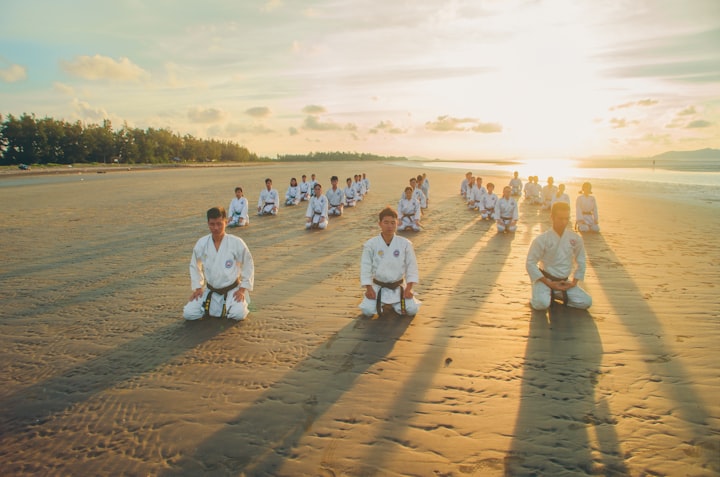Judo, a dynamic and captivating martial art, has evolved over the years to become a popular sport practiced by millions of people worldwide. Rooted in ancient Japanese martial arts, Judo combines physical prowess, mental discipline, and strategic techniques to create an engaging and challenging experience for its participants. In this article, we will explore the history, philosophy, techniques, and benefits of practicing Judo.
Originating in Japan in the late 19th century, Judo was founded by Dr. Jigoro Kano. Drawing inspiration from various traditional martial arts, Kano aimed to create a system that would emphasize efficiency and control, allowing a smaller individual to overcome a larger and stronger opponent. He named his creation Judo, which means "the gentle way," highlighting the use of technique and leverage rather than brute force.
Judo is built on a solid philosophical foundation. It promotes the development of physical, mental, and moral attributes, making it not just a sport but a way of life. Central to Judo's philosophy is the concept of mutual benefit and maximum efficiency. Practitioners are encouraged to use an opponent's strength against them, redirecting their force and applying precise techniques to gain advantage. This approach reflects the principle of "ju" or gentleness, which lies at the heart of Judo. It teaches practitioners to remain calm, composed, and focused, both on and off the mat.
In Judo, techniques can be broadly categorized into three types: throwing techniques (nage-waza), grappling techniques (katame-waza), and striking techniques (atemi-waza). The foundation of Judo lies in its throwing techniques, where practitioners aim to unbalance their opponents and throw them to the ground. These throws require a combination of timing, precision, and explosive power. Some well-known throws in Judo include ippon seoi-nage (one-arm shoulder throw), o-goshi (hip throw), and uchi-mata (inner thigh throw).
Once on the ground, Judo practitioners transition into grappling techniques to immobilize or submit their opponents. These techniques include joint locks and strangles, which are applied with control and precision. Judo also incorporates various pins, escapes, and transitions to maintain dominance on the ground. Unlike other martial arts, Judo discourages the use of striking techniques, focusing primarily on throws, grappling, and submissions.
Aside from the physical techniques, Judo places great emphasis on the development of mental and moral qualities. Through rigorous training, practitioners cultivate discipline, respect, and humility. The practice of Judo instills important values such as perseverance, self-confidence, and resilience. It encourages individuals to push their limits, overcome challenges, and strive for continuous improvement. These qualities extend beyond the confines of the dojo and positively impact various aspects of practitioners' lives.
Judo is not just a combat sport; it is also an Olympic sport. Since its introduction to the Olympic Games in 1964, Judo has gained global recognition and a significant following. The Olympic competition showcases the skill, agility, and mental fortitude of Judo practitioners from around the world. Athletes compete in different weight categories, showcasing their mastery of Judo's techniques and strategy.
The benefits of practicing Judo extend beyond the physical and philosophical aspects. Regular training in Judo offers numerous advantages for individuals of all ages and abilities. From a physical standpoint, Judo enhances strength, flexibility, and cardiovascular fitness. The explosive movements, throws, and grappling techniques engage multiple muscle groups, leading to improved overall fitness levels. Judo also develops coordination, agility, and balance, which are essential for effective execution of techniques.
Judo's emphasis on discipline and focus fosters mental well-being. The training demands concentration, quick decision-making, and situational awareness, sharpening the mind and improving cognitive abilities. The practice of Judo provides an outlet for stress and allows practitioners to develop mental resilience and composure in challenging situations.
Furthermore, Judo promotes social interaction and camaraderie. Training sessions involve partner drills, sparring, and group exercises, creating a supportive and collaborative environment. Practitioners learn to trust and rely on their training partners, fostering teamwork and mutual respect. The Judo community is known for its inclusiveness, with practitioners from diverse backgrounds coming together to learn and grow.
In conclusion, Judo is a captivating martial art and sport that encompasses physical prowess, mental discipline, and moral values. Its rich history, rooted in ancient Japanese martial arts, has led to the development of a sophisticated system that emphasizes efficiency and control. Through its throws, grappling techniques, and philosophy, Judo provides individuals with a holistic approach to physical fitness and personal development. The practice of Judo cultivates discipline, respect, and resilience while promoting social interaction and camaraderie. Whether one seeks self-improvement, competition, or a way to stay active, Judo offers a rewarding and transformative experience for practitioners of all ages and abilities.
About the Creator
Niq Bean
Writing and photography are my hobbies and Vocal is the platform where I want to display both.
Enjoyed the story? Support the Creator.
Subscribe for free to receive all their stories in your feed. You could also pledge your support or give them a one-off tip, letting them know you appreciate their work.







Comments
There are no comments for this story
Be the first to respond and start the conversation.